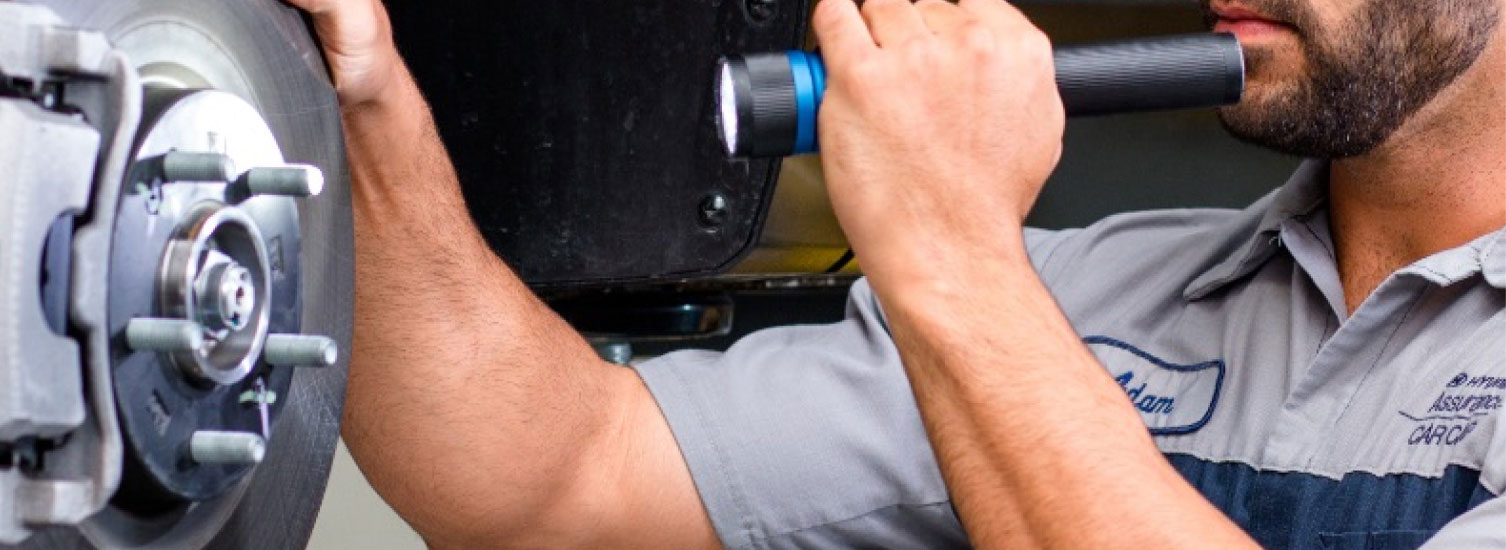
Why Are My Brakes Grinding?

Grinding brakes are part of the driving experience, often meaning a part of your system needs repair or replacement. Here at Colonial Hyundai of New London, CT, we see everything from grinding brakes to squealing and leaking systems, which we can help solve. If you are asking yourself, "Why are my brakes grinding?" and need assistance, this post is for you. Stick around!
Why Are My Brakes Grinding?
The reason why your brakes are grinding is usually to blame on worn pads and rotors. Your brake system is hydraulic, which works to convert the energy from your foot pressing the brake pedal into mechanical force. This force slows down your car, eventually bringing it to a total stop. When you have worn-down brake pads, for instance, this can cause the metal backing plate to contact the brake rotor, resulting in a "grinding" sound.
Worn Brake Pads
Worn brake pads are almost always the root cause of grinding while stopping and slowing. The less pad volume your brake has, the more chance the metal will rub against the rotors when your system activates.
Damaged Rotors
If you've been wondering, "Why are my brakes grinding?" damaged rotors could be the cause, as they create grinding sounds or sensations when warped or excessively worn. For Hyundai vehicles, you should try to replace these every 50,000 or so miles, although some people far exceed this timeline.
Debris Between Pads and Rotors
Debris between your brake pads and rotors can create unnecessary friction and grinding. If so, a professional technician can clean your brakes, which should stop the grinding sounds.
Poor Installation or Quality of Parts
In the event of a manufacturer defect, or if you went outside of Hyundai to get a pad or rotor replacement, poor installation can result in a grinding noise when you stop and slow down.
Signs That Your Brakes Are Grinding
If you're asking, "Why are my brakes grinding?", one of the clearest signs is a loud metallic noise when you engage your brakes. Think of two pieces of metal scraping against each other.
Unusual Noises When Braking
When something is wrong with your brake system, you might hear unusual noises, such as grinding, squealing, clicking, or thumping. Anything outside the normal quiet brake experience should be a cause for question.
Vibration or Pulsation in the Brake Pedal
Vibrations or pulsations when you put your foot on the brake pedal are signs of worn pads or damaged rotors and can be uncomfortable when behind the wheel. You may even feel these vibrations at your steering wheel as the issue worsens.
Reduced Stopping Power
If something is worn or damaged with the brake pads or rotors, your Hyundai's brakes will start to have reduced or delayed stopping power. This means longer times for complete stops and further distances it takes to slow or completely halt your vehicle.
Warning Lights on the Dashboard
If you suspect brake damage, the dashboard is a good place to look. A light should turn on as soon as your car's internal computers communicate that something is wrong with the brake system. If you see a brake light on the dashboard, we recommend swinging by your local dealership and having someone inspect and test your brake system. Colonial Hyundai of New London is here to help you with this.
Risks of Ignoring Grinding Brakes
If you ignore your grinding brakes, safety hazards, and risks will become everyday problems. As we mentioned, worn pads and rotors can trigger delayed or failing brakes, which puts you in danger. We recommend handling any brake-related problem with your Hyundai when you notice strange sounds, leaks, or a light on the dashboard.
Increased Repair Costs
It goes without saying that the longer you put off brake repair, the more expensive the eventual service will be. Catching a problem while small is always easier than falling behind with a major issue.
Safety Hazards on the Road
Bad brakes can cause on-road safety hazards, so you should know these. They include:
- Delayed stop or slow times
- Longer distances for stopping
- Loss of brake control
- Loss of steering control
- Pulling or veering to one side
Potential Damage to Other Brake Components
If you ignore grinding brakes, the entire system could end up damaged. Your brake pads and rotors depend on each other to activate, so when one goes bad, the other will follow. The same can be said about the master cylinder, brake booster, calipers, hoses, and brake pipes.
How to Address Grinding Brakes
If you're still asking, "Why are my brakes grinding?", the best course of action is to schedule an inspection with your nearest dealer/service center. A professional technician can check under your car and run diagnostics if necessary. From there, they can replace pads and rotors.
Inspecting Your Brake System
Drivers might want to do a visual brake system inspection every few months, but this can be difficult depending on your car knowledge and physical abilities. To inspect your brakes, you want to:
- Conduct a test drive to check for abnormal noises or vibrations
- Inspect the tires and suspension system
- Check for leaks or damage to hoses and steel lines
- Examine the brake master cylinder and calipers for leaks
- Inspect the rotors and drums for damage
When to Replace Brake Pads and Rotors
The best time to replace brake pads and rotors is between every 10,000 and 20,000 miles (pads) and your rotors every 50,000 to 70,000 miles. Doing this ensures that grinding or part damage won't be as likely.
When to Consider Professional Service
If you hear strange sounds, feel less control when stopping or slowing, or notice leaks from your brake system, consider scheduling a professional Hyundai brake repair service. Colonial Hyundai's service team is here for all brake repairs and replacements, so feel free to call us with any questions or concerns.

